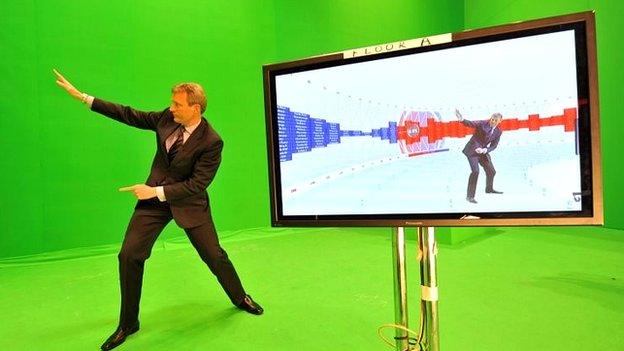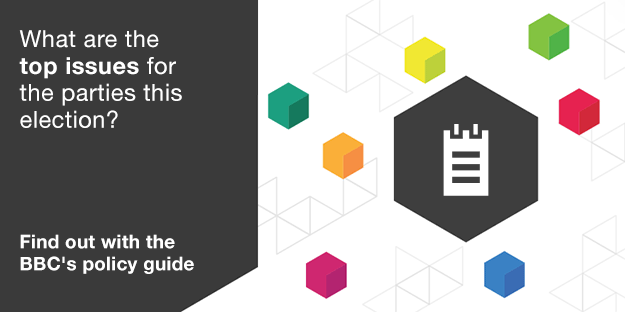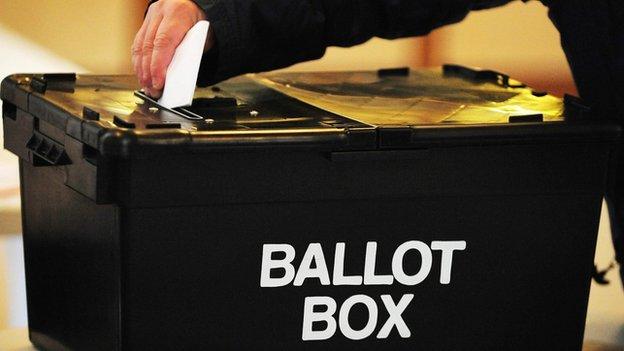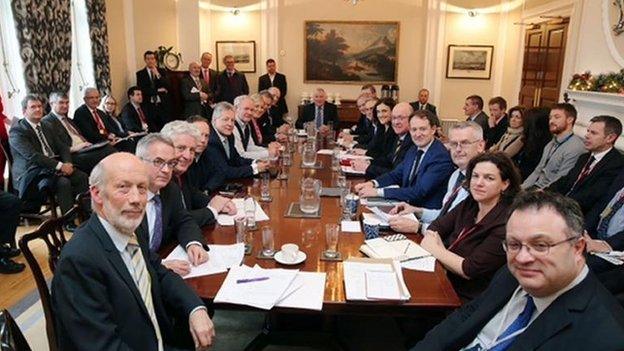Election 2015: For Northern Ireland it could be all about the deals
- Published
Parliament has been dissolved and all of its seats are now vacant.
The formal contest to fill them when the UK votes on 7 May is now under way.
In Northern Ireland's 18 constituencies the campaign looks certain to be to be dominated by deals.
Deals to support a minority government in a hung parliament; a deal between the two main unionist parties in four constituencies and the rescuing of a deal deadlocked at Stormont.

Hung parliament deals opportunity for influence

Predicting the outcome is a challenge for pundits but may create opportunity for smaller parties
In a hung parliament, where no single party has enough seats to outvote all the others, smaller parties have a rare chance to decide who gets the key to 10 Downing Street, external or to influence government policy.
In 2010, a formal coalition between the Conservatives and the Liberal Democrats mustered enough votes to form and run a government.
This time, the polls are predicting that it will take a coalition, or vote by vote agreement, by at least three parties to to secure a majority for whichever of the larger parties can make the right deals.
The Democratic Unionist Party, which held eight seats in the last parliament, has already been spelling out the price of its support.

Party leader Peter Robinson has refused to put a number on it, external but cash for Northern Ireland is a priority.
He has said that the DUP will work with either the Conservatives or Labour to get the deal it wants but that the party is opposed to any arrangement that benefits parties, like the Scottish National Party or Plaid Cymru, whose aim is to break up the United Kingdom.
The biggest nationalist party in Northern Ireland, Sinn Féin, which won five seats in 2010, refuses to take the seats it wins in Westminster elections, on principle.
The number of House of Commons seats is 650 so any Sinn Féin MPs will have to be deducted from that in calculating what constitutes a majority.
Northern Ireland's other main nationalist party, the SDLP, does take its seats.
In the last parliament, the SDLP had three MPs.
The party has yet to say what it would seek in return for the support of however many MPs it returns to Westminster but in 2010 it said it would use any influence it had in a hung parliament to benefit the people of Northern Ireland and to counterbalance unionist demands.
Of the two seats not held by those parties in the last parliament, one was held by the Alliance Party and the other by an independent.

Unionist deal over candidates

The DUP and the Ulster Unionist Party have agreed a deal in which there would be only one candidate from their parties in each of four constituencies.
The Ulster Unionists agreed to step aside in North Belfast and East Belfast and the DUP said it would not run candidates in either Fermanagh and South Tyrone or Newry and Armagh.
Alliance described the unionist pact as anti-democratic and the SDLP described it as "a sectarian carve-up".
A Sinn Féin offer of a similar deal was rejected by the SDLP, external.
Sinn Féin said the proposed agreement would be about "progressive politics" but the SDLP said it "did not enter into sectarian pacts".

Breaking Stormont deal deadlock

The Stormont House Agreement was reached just before Christmas
In December 2014, the five main parties in the Northern Ireland Assembly reached broad agreement on a number of contentious issues that threatened the stability and effectiveness of the Stormont Executive.
A key issue was welfare reform.
As part of the Stormont House Agreement, external, MLAs struck a deal to create a fund that would help benefit recipients who will lose money as a result of changes passed at Westminster but not yet implemented in Northern Ireland.
However, Sinn Féin suddenly withdrew its support for a welfare reform bill on 9 March, accusing the DUP of reneging on commitments. The DUP accused Sinn Féin of bad faith.
The row stalled the entire deal, putting several key plans at risk.
Talks have continued to salvage the deal but it may yet take the outcome of a highly unpredictable election to decide its fate.